- Home
- Edith Wharton
The Descent of Man and Other Stories Page 7
The Descent of Man and Other Stories Read online
Page 7
III
It was several weeks later that Mrs. Clinch once more brought the plebeian aroma of heated tram-cars and muddy street-crossings into the violet-scented atmosphere of her cousin’s drawing-room.
“Well,” she said, tossing a damp bundle of proof into the corner of a silk-cushioned bergere, “I’ve read it at last and I’m not so awfully shocked!”
Mrs. Fetherel, who sat near the fire with her head propped on a languid hand, looked up without speaking.
“Mercy, Paula,” said her visitor, “you’re ill.”
Mrs. Fetherel shook her head. “I was never better,” she said, mournfully.
“Then may I help myself to tea? Thanks.”
Mrs. Clinch carefully removed her mended glove before taking a buttered tea-cake; then she glanced again at her cousin.
“It’s not what I said just now—?” she ventured.
“Just now?”
“About ‘Fast and Loose’? I came to talk it over.”
Mrs. Fetherel sprang to her feet. “I never,” she cried dramatically, “want to hear it mentioned again!”
“Paula!” exclaimed Mrs. Clinch, setting down her cup.
Mrs. Fetherel slowly turned on her an eye brimming with the incommunicable; then, dropping into her seat again, she added, with a tragic laugh, “There’s nothing left to say.”
“Nothing—?” faltered Mrs. Clinch, longing for another tea-cake, but feeling the inappropriateness of the impulse in an atmosphere so charged with the portentous. “Do you mean that everything has been said?” She looked tentatively at her cousin. “Haven’t they been nice?”
“They’ve been odious—odious—” Mrs. Fetherel burst out, with an ineffectual clutch at her handkerchief. “It’s been perfectly intolerable!”
Mrs. Clinch, philosophically resigning herself to the propriety of taking no more tea, crossed over to her cousin and laid a sympathizing hand on that lady’s agitated shoulder.
“It is a bore at first,” she conceded; “but you’ll be surprised to see how soon one gets used to it.”
“I shall—never—get—used to it—” Mrs. Fetherel brokenly declared.
“Have they been so very nasty—all of them?”
“Every one of them!” the novelist sobbed.
“I’m so sorry, dear; it does hurt, I know—but hadn’t you rather expected it?”
“Expected it?” cried Mrs. Fetherel, sitting up.
Mrs. Clinch felt her way warily. “I only mean, dear, that I fancied from what you said before the book came out—that you rather expected—that you’d rather discounted—”
“Their recommending it to everybody as a perfectly harmless story?”
“Good gracious! Is that what they’ve done?”
Mrs. Fetherel speechlessly nodded.
“Every one of them?”
“Every one—”
“Whew!” said Mrs. Clinch, with an incipient whistle.
“Why, you’ve just said it yourself!” her cousin suddenly reproached her.
“Said what?”
“That you weren’t so awfully shocked—”
“I? Oh, well—you see, you’d keyed me up to such a pitch that it wasn’t quite as bad as I expected—”
Mrs. Fetherel lifted a smile steeled for the worst. “Why not say at once,” she suggested, “that it’s a distinctly pretty story?”
“They haven’t said that?”
“They’ve all said it.”
“My poor Paula!”
“Even the Bishop—”
“The Bishop called it a pretty story?”
“He wrote me—I’ve his letter somewhere. The title rather scared him—he wanted me to change it; but when he’d read the book he wrote that it was all right and that he’d sent several copies to his friends.”
“The old hypocrite!” cried Mrs. Clinch. “That was nothing but professional jealousy.”
“Do you think so?” cried her cousin, brightening.
“Sure of it, my dear. His own books don’t sell, and he knew the quickest way to kill yours was to distribute it through the diocese with his blessing.”
“Then you don’t really think it’s a pretty story?”
“Dear me, no! Not nearly as bad as that—”
“You’re so good, Bella—but the reviewers?”
“Oh, the reviewers,” Mrs. Clinch jeered. She gazed meditatively at the cold remains of her tea-cake. “Let me see,” she said, suddenly; “do you happen to remember if the first review came out in an important paper?”
“Yes—the ‘Radiator.’”
“That’s it! I thought so. Then the others simply followed suit: they often do if a big paper sets the pace. Saves a lot of trouble. Now if you could only have got the ‘Radiator’ to denounce you—”
“That’s what the Bishop said!” cried Mrs. Fetherel.
“He did?”
“He said his only chance of selling ‘Through a Glass Brightly’ was to have it denounced on the ground of immorality.”
“H’m,” said Mrs. Clinch. “I thought he knew a trick or two.” She turned an illuminated eye on her cousin. “You ought to get him to denounce ‘Fast and Loose’!” she cried.
Mrs. Fetherel looked at her suspiciously. “I suppose every book must stand or fall on its own merits,” she said in an unconvinced tone.
“Bosh! That view is as extinct as the post-chaise and the packet-ship—it belongs to the time when people read books. Nobody does that now; the reviewer was the first to set the example, and the public were only too thankful to follow it. At first they read the reviews; now they read only the publishers’ extracts from them. Even these are rapidly being replaced by paragraphs borrowed from the vocabulary of commerce. I often have to look twice before I am sure if I am reading a department-store advertisement or the announcement of a new batch of literature. The publishers will soon be having their ‘fall and spring openings’ and their ‘special importations for Horse-Show Week.’ But the Bishop is right, of course—nothing helps a book like a rousing attack on its morals; and as the publishers can’t exactly proclaim the impropriety of their own wares, the task has to be left to the press or the pulpit.”
“The pulpit—?” Mrs. Fetherel mused.
“Why, yes—look at those two novels in England last year—”
Mrs. Fetherel shook her head hopelessly. “There is so much more interest in literature in England than here.”
“Well, we’ve got to make the supply create the demand. The Bishop could run your novel up into the hundred thousands in no time.”
“But if he can’t make his own sell—?”
“My dear, a man can’t very well preach against his own writings!”
Mrs. Clinch rose and picked up her proofs.
“I’m awfully sorry for you, Paula dear,” she concluded, “but I can’t help being thankful that there’s no demand for pessimism in the field of natural history. Fancy having to write ‘The Fall of a Sparrow,’ or ‘How the Plants Misbehave!’”
IV
Mrs. Fetherel, driving up to the Grand Central Station one morning about five months later, caught sight of the distinguished novelist, Archer Hynes, hurrying into the waiting-room ahead of her. Hynes, on his side, recognizing her brougham, turned back to greet her as the footman opened the carriage-door.
“My dear colleague! Is it possible that we are traveling together?”
Mrs. Fetherel blushed with pleasure. Hynes had given her two columns of praise in the Sunday “Meteor,” and she had not yet learned to disguise her gratitude.
“I am going to Ossining,” she said, smilingly.
“So am I. Why, this is almost as good as an elopement.”
“And it will end where elopements ought to—in church.”
“In church? You’re not going to Ossining to go to church?”
“Why not? There’s a special ceremony in the cathedral—the chantry window is to be unveiled.”
“The chantry window? How picturesque! What is a
chantry? And why do you want to see it unveiled? Are you after copy—doing something in the Huysmans manner? ‘La Cathedrale,’ eh?”
“Oh, no.” Mrs. Fetherel hesitated. “I’m going simply to please my uncle,” she said, at last.
“Your uncle?”
“The Bishop, you know.” She smiled.
“The Bishop—the Bishop of Ossining? Why, wasn’t he the chap who made that ridiculous attack on your book? Is that prehistoric ass your uncle? Upon my soul, I think you’re mighty forgiving to travel all the way to Ossining for one of his stained-glass sociables!”
Mrs. Fetherel’s smile flowed into a gentle laugh. “Oh, I’ve never allowed that to interfere with our friendship. My uncle felt dreadfully about having to speak publicly against my book—it was a great deal harder for him than for me—but he thought it his duty to do so. He has the very highest sense of duty.”
“Well,” said Hynes, with a shrug, “I don’t know that he didn’t do you a good turn. Look at that!”
They were standing near the bookstall, and he pointed to a placard surmounting the counter and emblazoned with the conspicuous announcement: “Fast and Loose. New Edition with Author’s Portrait. Hundred and Fiftieth Thousand.”
Mrs. Fetherel frowned impatiently. “How absurd! They’ve no right to use my picture as a poster!”
“There’s our train,” said Hynes; and they began to push their way through the crowd surging toward one of the inner doors.
As they stood wedged between circumferent shoulders, Mrs. Fetherel became conscious of the fixed stare of a pretty girl who whispered eagerly to her companion: “Look Myrtle! That’s Paula Fetherel right behind us—I knew her in a minute!”
“Gracious—where?” cried the other girl, giving her head a twist which swept her Gainsborough plumes across Mrs. Fetherel’s face.
The first speaker’s words had carried beyond her companion’s ear, and a lemon-colored woman in spectacles, who clutched a copy of the “Journal of Psychology” on one drab-cotton-gloved hand, stretched her disengaged hand across the intervening barrier of humanity.
“Have I the privilege of addressing the distinguished author of ‘Fast and Loose’? If so, let me thank you in the name of the Woman’s Psychological League of Peoria for your magnificent courage in raising the standard of revolt against—”
“You can tell us the rest in the car,” said a fat man, pressing his good-humored bulk against the speaker’s arm.
Mrs. Fetherel, blushing, embarrassed and happy, slipped into the space produced by this displacement, and a few moments later had taken her seat in the train.
She was a little late, and the other chairs were already filled by a company of elderly ladies and clergymen who seemed to belong to the same party, and were still busy exchanging greetings and settling themselves in their places.
One of the ladies, at Mrs. Fetherel’s approach, uttered an exclamation of pleasure and advanced with outstretched hand. “My dear Mrs. Fetherel! I am so delighted to see you here. May I hope you are going to the unveiling of the chantry window? The dear Bishop so hoped that you would do so! But perhaps I ought to introduce myself. I am Mrs. Gollinger”—she lowered her voice expressively—“one of your uncle’s oldest friends, one who has stood close to him through all this sad business, and who knows what he suffered when he felt obliged to sacrifice family affection to the call of duty.”
Mrs. Fetherel, who had smiled and colored slightly at the beginning of this speech, received its close with a deprecating gesture.
“Oh, pray don’t mention it,” she murmured. “I quite understood how my uncle was placed—I bore him no ill will for feeling obliged to preach against my book.”
“He understood that, and was so touched by it! He has often told me that it was the hardest task he was ever called upon to perform—and, do you know, he quite feels that this unexpected gift of the chantry window is in some way a return for his courage in preaching that sermon.”
Mrs. Fetherel smiled faintly. “Does he feel that?”
“Yes; he really does. When the funds for the window were so mysteriously placed at his disposal, just as he had begun to despair of raising them, he assured me that he could not help connecting the fact with his denunciation of your book.”
“Dear uncle!” sighed Mrs. Fetherel. “Did he say that?”
“And now,” continued Mrs. Gollinger, with cumulative rapture—“now that you are about to show, by appearing at the ceremony to-day, that there has been no break in your friendly relations, the dear Bishop’s happiness will be complete. He was so longing to have you come to the unveiling!”
“He might have counted on me,” said Mrs. Fetherel, still smiling.
“Ah, that is so beautifully forgiving of you!” cried Mrs. Gollinger, enthusiastically. “But then, the Bishop has always assured me that your real nature was very different from that which—if you will pardon my saying so—seems to be revealed by your brilliant but—er—rather subversive book. ‘If you only knew my niece, dear Mrs. Gollinger,’ he always said, ‘you would see that her novel was written in all innocence of heart;’ and to tell you the truth, when I first read the book I didn’t think it so very, very shocking. It wasn’t till the dear Bishop had explained tome—but, dear me, I mustn’t take up your time in this way when so many others are anxious to have a word with you.”
Mrs. Fetherel glanced at her in surprise, and Mrs. Gollinger continued, with a playful smile: “You forget that your face is familiar to thousands whom you have never seen. We all recognized you the moment you entered the train, and my friends here are so eager to make your acquaintance—even those”—her smile deepened—“who thought the dear Bishop not quite unjustified in his attack on your remarkable novel.”
V
A religious light filled the chantry of Ossining Cathedral, filtering through the linen curtain which veiled the central window, and mingling with the blaze of tapers on the richly adorned altar.
In this devout atmosphere, agreeably laden with the incense-like aroma of Easter lilies and forced lilacs, Mrs. Fetherel knelt with a sense of luxurious satisfaction. Beside her sat Archer Hynes, who had remembered that there was to be a church scene in his next novel, and that his impressions of the devotional environment needed refreshing. Mrs. Fetherel was very happy. She was conscious that her entrance had sent a thrill through the female devotees who packed the chantry, and she had humor enough to enjoy the thought that, but for the good Bishop’s denunciation of her book, the heads of his flock would not have been turned so eagerly in her direction. Moreover, as she had entered she had caught sight of a society reporter, and she knew that her presence, and the fact that she was accompanied by Hynes, would be conspicuously proclaimed in the morning papers. All these evidences of the success of her handiwork might have turned a calmer head than Mrs. Fetherel’s; and though she had now learned to dissemble her gratification, it still filled her inwardly with a delightful glow.
The Bishop was somewhat late in appearing, and she employed the interval in meditating on the plot of her next novel, which was already partly sketched out, but for which she had been unable to find a satisfactory denouement. By a not uncommon process of ratiocination, Mrs. Fetherel’s success had convinced her of her vocation. She was sure now that it was her duty to lay bare the secret plague-spots of society, and she was resolved that there should be no doubt as to the purpose of her new book. Experience had shown her that where she had fancied she was calling a spade a spade she had in fact been alluding in guarded terms to the drawing-room shovel. She was determined not to repeat the same mistake, and she flattered herself that her coming novel would not need an episcopal denunciation to insure its sale, however likely it was to receive this crowning evidence of success.
She had reached this point in her meditations when the choir burst into song and the ceremony of the unveiling began. The Bishop, almost always felicitous in his addresses to the fair sex, was never more so than when he was celebrating the triumph of one of hi
s cherished purposes. There was a peculiar mixture of Christian humility and episcopal exultation in the manner with which he called attention to the Creator’s promptness in responding to his demand for funds, and he had never been more happily inspired than in eulogizing the mysterious gift of the chantry window.
Though no hint of the donor’s identity had been allowed to escape him, it was generally understood that the Bishop knew who had given the window, and the congregation awaited in a flutter of suspense the possible announcement of a name. None came, however, though the Bishop deliciously titillated the curiosity of his flock by circling ever closer about the interesting secret. He would not disguise from them, he said, that the heart which had divined his inmost wish had been a woman’s—is it not to woman’s intuitions that more than half the happiness of earth is owing? What man is obliged to learn by the laborious process of experience, woman’s wondrous instinct tells her at a glance; and so it had been with this cherished scheme, this unhoped-for completion of their beautiful chantry. So much, at least, he was allowed to reveal; and indeed, had he not done so, the window itself would have spoken for him, since the first glance at its touching subject and exquisite design would show it to have originated in a woman’s heart. This tribute to the sex was received with an audible sigh of contentment, and the Bishop, always stimulated by such evidence of his sway over his hearers, took up his theme with gathering eloquence.
Yes—a woman’s heart had planned the gift, a woman’s hand had executed it, and, might he add, without too far withdrawing the veil in which Christian beneficence ever loved to drape its acts—might he add that, under Providence, a book, a simple book, a mere tale, in fact, had had its share in the good work for which they were assembled to give thanks?
At this unexpected announcement, a ripple of excitement ran through the assemblage, and more than one head was abruptly turned in the direction of Mrs. Fetherel, who sat listening in an agony of wonder and confusion. It did not escape the observant novelist at her side that she drew down her veil to conceal an uncontrollable blush, and this evidence of dismay caused him to fix an attentive gaze on her, while from her seat across the aisle, Mrs. Gollinger sent a smile of unctuous approval.

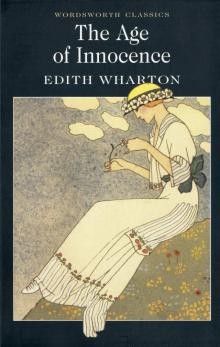 The Age of Innocence
The Age of Innocence The Reef
The Reef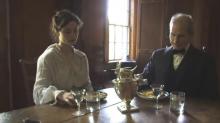 Summer
Summer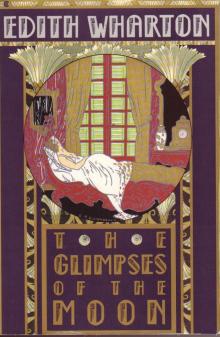 The Glimpses of the Moon
The Glimpses of the Moon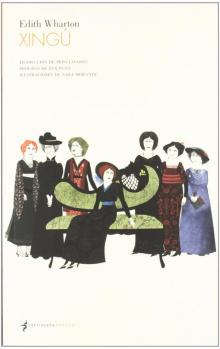 Xingu
Xingu The Fruit of the Tree
The Fruit of the Tree Fast and Loose
Fast and Loose Artemis to Actaeon and Other Verse
Artemis to Actaeon and Other Verse The Line of Least Resistance
The Line of Least Resistance The Lamp of Psyche
The Lamp of Psyche The Reckoning
The Reckoning Afterward
Afterward The New York Stories of Edith Wharton
The New York Stories of Edith Wharton The 2014 Halloween Horrors Megapack
The 2014 Halloween Horrors Megapack 'Copy': A Dialogue
'Copy': A Dialogue The Recovery
The Recovery The Fulness of Life
The Fulness of Life Early Short Stories Vol. 1
Early Short Stories Vol. 1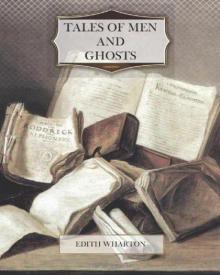 Tales of Men and Ghosts
Tales of Men and Ghosts The House of the Dead Hand
The House of the Dead Hand That Good May Come
That Good May Come The Buccaneers
The Buccaneers Other Times, Other Manners
Other Times, Other Manners The Hermit and the Wild Woman
The Hermit and the Wild Woman Kerfol
Kerfol The Duchess at Prayer
The Duchess at Prayer Bunner Sisters
Bunner Sisters The Choice
The Choice Madame De Treymes
Madame De Treymes Ethan Frome, Summer, Bunner Sisters
Ethan Frome, Summer, Bunner Sisters In Morocco
In Morocco The Valley of Decision
The Valley of Decision Age of Innocence (Barnes & Noble Classics Series)
Age of Innocence (Barnes & Noble Classics Series) The Angel at the Grave
The Angel at the Grave April Showers
April Showers Sanctuary
Sanctuary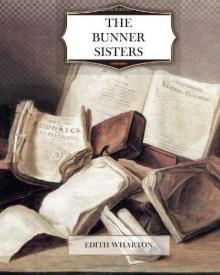 The Bunner Sisters
The Bunner Sisters Mrs. Manstey's View
Mrs. Manstey's View Writing a War Story
Writing a War Story The Custom of the Country
The Custom of the Country In Trust
In Trust The Triumph of the Night
The Triumph of the Night The Hermit and the Wild Woman, and Other Stories
The Hermit and the Wild Woman, and Other Stories Roman Fever and Other Stories
Roman Fever and Other Stories The Mission of Jane
The Mission of Jane The Descent of Man and Other Stories
The Descent of Man and Other Stories Coming Home
Coming Home The Touchstone
The Touchstone Early Short Stories Vol. 2
Early Short Stories Vol. 2 Edith Wharton's Verse, 1879-1919, from various journals.
Edith Wharton's Verse, 1879-1919, from various journals.